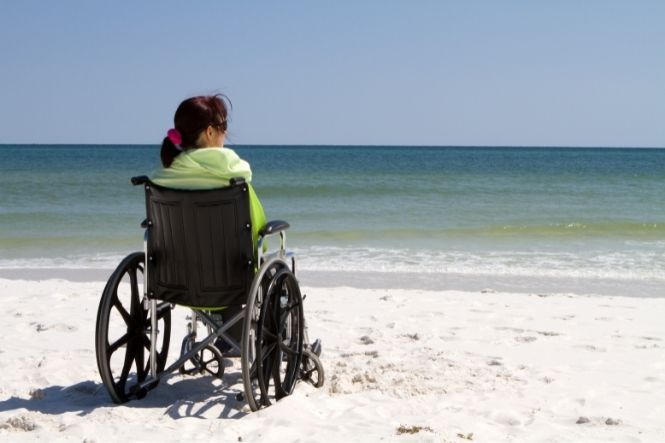What does the word ‘holiday’ mean to you? To most people it conjures up images of sun, sea and sand, the perfect setting for relaxation. Making the most of these things may seem challenging if you have a disability, but there are ways to work around common problems so that you can enjoy a wonderful beach holiday.
Beach Resorts
Beach resorts are becoming increasingly disability-friendly, with most of the popular destinations in Europe now offering extensive accessible accommodation and a range of support services to help your trip go more smoothly. Most travel agents can provide advice and help you to explore the facilities before you make your final choice.
In the UK, the accessibility of beach resorts varies. In Scotland and northern England most are built around older towns which may have limited accessible accommodation. The south of England and Wales are generally better, and also benefit from large areas of coastline with level access to the beach. Some cliffside resorts have lifts for wheelchair users, but these tend to operate only during the high season and may do so for limited hours, so check before you go.
On the Beach
If you are an ambulant person with mobility difficulties, you will probably find beaches with firm sand the easiest to manage on, but this doesn’t mean other types of beach are out of bounds. It’s a good idea to take a walking stick or hikers’ walking poles for added support on a beach with shingle or deep sand, even if you don’t normally use them. A single pole, or the shaft of a beach umbrella, can be hammered into the sand to help you lift yourself from a sitting or lying position.
Deckchairs are a problem for many disabled people – they may look appealing, but getting out of them can be a challenge. Camping shops sell lightweight, folding chairs with an upright shape which can be a useful alternative if you don’t want to have to get help every time you wish to stand.
Beach Wheelchairs
Taking an ordinary wheelchair on most types of beach can be a nightmare – it’s easy to get bogged down in sand or shingle, unable to move, and the chair risks getting damaged too. Fortunately there are specially designed beach wheelchairs which move easily over terrain like this. They’re ideal if you want to enjoy active beach fun, and some can even recline so that you can sunbathe as if you were in a deckchair.
Many holiday resorts hire out beach wheelchairs, though you may need to book in advance, so it’s best to enquire when you book your holiday. As an alternative, there are wheelchair beach conversion kits that basically involve fitting different wheels to your existing chair to improve the way it copes with the beach. These are relatively inexpensive and easy to take with you, no matter how you’re travelling.
Safety Considerations
Finally, remember that although the sun is fun it can also damage you. It’s particularly important to keep this in mind if you have mobility difficulties and may not be able to get to shelter quickly when you realise you’re getting burnt. Use a suntan lotion appropriate for your skin type. Take along a wide-brimmed hat and a top with sleeves in case of problems.
Good planning at the outset should mean that your holiday goes like a breeze and you can have a great time soaking up the sun.

